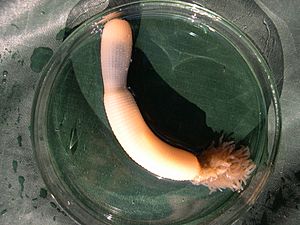Priapulida facts for kids
Quick facts for kids PriapulidaTemporal range: Middle Cambrian to Recent
|
|
|---|---|
 |
|
| Priapulus caudatus | |
| Scientific classification | |
| Kingdom: | |
| Phylum: |
Priapulida
Théel, 1906
|
Priapulida (say "pry-AP-yoo-lih-duh") are a group of sea worms. They are also called priapulid worms. Their name comes from their special snout, which can stretch out and has spines. These worms live in the mud at the bottom of the ocean. They eat the mud and the tiny things in it. You can find them in waters that are not too deep, usually up to about 90 meters (around 295 feet).
Priapulid Relatives
Priapulids have some close relatives in the animal kingdom. Their closest family members are probably the Kinorhyncha and Loricifera. Together, these three groups form a larger group called Scalidophora.
Priapulids are also part of an even bigger group called Ecdysozoa. This group includes animals that shed their outer skin or shell as they grow, like arthropods (insects, spiders, crabs) and velvet worms. Priapulids are special because they are some of the largest animals in the Ecdysozoa group, besides arthropods and velvet worms.
What Priapulids Eat
These worms are predators. This means they hunt and eat other animals. They like to eat slow-moving invertebrates. A common meal for them might be other worms, like polychaete worms.
Priapulids Through Time
Scientists have found fossils of priapulid worms that are very, very old. Some of these fossils date back to the Middle Cambrian period. That was about 500 million years ago! During the Cambrian period, priapulids were likely important hunters in the ancient oceans.
Even though they have been around for a long time, there are not many types of priapulid worms alive today. Scientists only know about sixteen different living species of these unique worms.
Images for kids
-
Ottoia tricuspida in the Burgess Shale. Middle Cambrian
See also
In Spanish: Priapulida para niños
 | Janet Taylor Pickett |
 | Synthia Saint James |
 | Howardena Pindell |
 | Faith Ringgold |




